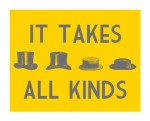A RELIGION FOR GREATNESS
Prelude:
Friedrich Schleirermacher (1768-1834), considered by many to be the “Father of Modern Protestant Theology”, in his Addresses on Religion (1799), remarked:
 “Religion is the outcome neither of the fear of death nor the fear of God. It answers a deep need in man. It is not a metaphysic, nor a morality, but above all essentially an intuition and a feeling…Dogmas are not, properly speaking, part of religion: rather it is that they are derived from it. Religion is the miracle of the direct relationship with the infinite. Similarly belief in God, and in personal immortality, are not necessarily part of religion; one can conceive of a religion without God, and it would be pure contemplation of the universe; the desire for personal immortality seems rather to show a lack of religion, since religion assumes a desire to lose oneself in the infinite, rather than to preserve one’s own finite self.”
“Religion is the outcome neither of the fear of death nor the fear of God. It answers a deep need in man. It is not a metaphysic, nor a morality, but above all essentially an intuition and a feeling…Dogmas are not, properly speaking, part of religion: rather it is that they are derived from it. Religion is the miracle of the direct relationship with the infinite. Similarly belief in God, and in personal immortality, are not necessarily part of religion; one can conceive of a religion without God, and it would be pure contemplation of the universe; the desire for personal immortality seems rather to show a lack of religion, since religion assumes a desire to lose oneself in the infinite, rather than to preserve one’s own finite self.”
Consider this:
There is a universal religious experience that crosses all time and culture. It dissolves illusions of individual separateness. It is that which Clarence Skinner, 20th century Universalist minister and social activist, deemed “radical religion”. Radical in that it returns religion back to its primary roots, which from the earliest recordings of human existence has been to “lift man out of his isolation into union with powers and influences greater than himself.”
By way of example, Skinner (in his classic A Religion for Greatness) relates the findings of looking through a spectroscope on the farthest star: “We get a series of light bands informing us of its chemical composition. Turn this same instrument on man and we find the same light bands, indicating the identical chemical composition! What does that prove? Precisely this, Man and the universe are one.”
 The extent to which this Reality can be lived out in a way that brings lasting positive transformation in the world depends on a commitment to be “continually cleansed of self-centerdness.” Selfishness, greed, ruthlessness, or deceit expose a “contractive organism that clutches and holds things to itself. The source of its unsocial attitudes and conduct is the tension centering around the ‘I’. Ease the tension and you lessen the unsocial complex…Contemplation thrusts us from our tiny thrones and renders us subjects of a greater kingdom.”
The extent to which this Reality can be lived out in a way that brings lasting positive transformation in the world depends on a commitment to be “continually cleansed of self-centerdness.” Selfishness, greed, ruthlessness, or deceit expose a “contractive organism that clutches and holds things to itself. The source of its unsocial attitudes and conduct is the tension centering around the ‘I’. Ease the tension and you lessen the unsocial complex…Contemplation thrusts us from our tiny thrones and renders us subjects of a greater kingdom.”
The great mystics of centuries past have discovered this Truth. The sense of division between the individual and the other is a major cause of perpetual suffering. Lest we think this is simply thinking left to those living in the stratosphere of theological idealists, Skinner includes that religion, like other institutional endeavors “must yield to emergency and must bend itself to the tasks of alleviating the suffering of the intensely now.” He takes into account the fact that the “frame of reference in which most of us live is that of the immediate.” However, there is a time when instead of hurriedly trying to “fix” this or that issue; it is imperative to expand our ideas of inclusion (even when our first thought is to turn away).
A closing meditation:
 “My life is not so much mine as a particle of the Infinite life encased for a passing moment in a frame which houses it in fragile solitariness. It is the drop of water lifted for a brief day by the lotus leaf from the pool. Soon the drop will fall back into the source whence it came- merged in water which is common not only to the one pool, but with all water everywhere.”
“My life is not so much mine as a particle of the Infinite life encased for a passing moment in a frame which houses it in fragile solitariness. It is the drop of water lifted for a brief day by the lotus leaf from the pool. Soon the drop will fall back into the source whence it came- merged in water which is common not only to the one pool, but with all water everywhere.”











